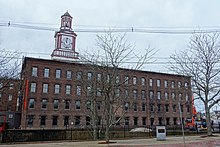
Back ديجيتال إكوبمينت Arabic دیجیتال ایکویپمنت قورومو AZB Digital Equipment Corporation Bulgarian Digital Equipment Corporation Catalan Digital Equipment Corporation Czech Digital Equipment Corporation CV Digital Equipment Corporation Danish Digital Equipment Corporation German Digital Equipment Corporation Esperanto Digital Equipment Corporation Spanish
 | |
 Assabet Woolen Mill, former headquarters of Digital Equipment Corporation from 1957 to 1992 | |
| Industry | Computer hardware Computer software Computer services |
|---|---|
| Founded | 1957 |
| Founder | Ken Olsen Harlan Anderson |
| Defunct | 1998 |
| Fate | Acquired by Compaq, after the divestiture of major assets. |
| Successor | Compaq (1998–2002) Hewlett-Packard (2002–2015) HP Inc. and Hewlett Packard Enterprise (2015–present) |
| Headquarters | Maynard, Massachusetts, United States |
Key people | Ken Olsen (founder, president, and chairman) C. Gordon Bell (VP Engineering, 1972–83) |
| Products | PDP minicomputers VAX minicomputers Alpha servers and workstations DECnet VT100 terminal LAT and Terminal server StrongARM microprocessors Digital Linear Tape Flip-Chip modules System Modules |
Number of employees | over 140,000 (1987) |
Digital Equipment Corporation (DEC /dɛk/), using the trademark Digital, was a major American company in the computer industry from the 1960s to the 1990s. The company was co-founded by Ken Olsen and Harlan Anderson in 1957. Olsen was president until he was forced to resign in 1992, after the company had gone into precipitous decline.
The company produced many different product lines over its history. It is best known for the work in the minicomputer market starting in the mid-1960s. The company produced a series of machines known as the PDP line, with the PDP-8 and PDP-11 being among the most successful minis in history. Their success was only surpassed by another DEC product, the late-1970s VAX "supermini" systems that were designed to replace the PDP-11. Although a number of competitors had successfully competed with Digital through the 1970s, the VAX cemented the company's place as a leading vendor in the computer space.
As microcomputers improved in the late 1980s, especially with the introduction of RISC-based workstation machines, the performance niche of the minicomputer was rapidly eroded. By the early 1990s, the company was in turmoil as their mini sales collapsed and their attempts to address this by entering the high-end market with machines like the VAX 9000 were market failures. After several attempts to enter the workstation and file server market, the DEC Alpha product line began to make successful inroads in the mid-1990s, but was too late to save the company.
DEC was acquired in June 1998 by Compaq in what was at that time the largest merger in the history of the computer industry. During the purchase, some parts of DEC were sold to other companies; the compiler business and the Hudson Fab were sold to Intel. At the time, Compaq was focused on the enterprise market and had recently purchased several other large vendors. DEC was a major player overseas where Compaq had less presence. However, Compaq had little idea what to do with its acquisitions,[1][2] and soon found itself in financial difficulty of its own. Compaq subsequently merged with Hewlett-Packard (HP) in May 2002.
- ^ Shankland, Stephen (January 2, 2002). "Dell topples Compaq in U.S. market share". CNET.
- ^ "What was left was a stalled engine with a very expensive head count." "Buying Digital played into Eckhard's fantasy, but it's turning out to be a beast that's consuming the company," said one former executive who left before the acquisition."Compaq Message Board - Msg: 9675868".
© MMXXIII Rich X Search. We shall prevail. All rights reserved. Rich X Search